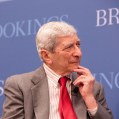What Conflicts Continue as Russia Moves to Dominate Again Facts
In the early morning of February 24, Russia launched a full-scale military assault on Ukraine, bombing major cities such as Kyiv, Kharkiv, and Odesa and invading from Russia, Belarus, Crimea, and the Black Sea. The attack followed months of troop buildups, Russian ultimatums to the United States and NATO, negotiations with the U.S. and European leaders, and U.S. warnings of Russian invasion plans, and was preceded by Moscow's recognition of two separatist enclaves in eastern Ukraine as independent.
Below, Brookings experts analyze the implications of the invasion, for Europe, Russia, international order, U.S. foreign policy, and much more, and offer policy recommendations for the United States, European, and other governments.
 Pavel K. Baev
Pavel K. Baev
Nonresident Senior Fellow, Center on the United States and Europe
Despite the strong evidence of Russian preparations for a massive invasion, there was, in my reading, and in the opinion of my many friends in Moscow, a strong possibility to avoid the war and promote the momentum for de-escalation. It is not that the idea of a war between Russia and Ukraine was too hard to contemplate; it was rather the assumption that the corrupt regime brings together thieves and rent-seekers, who are not "warriors," but rather cowards and crooks. There was no propaganda campaign in Russia beating patriotic drums for war, which also supported the assumption it was a show of force and posturing. The conflict between progressively autocratic Russia and the West is fundamental and grows deeper with every spike in repressions, but the spasm of this conflict that started last November with the massing of troops and a diplomatic offensive seemed artificially orchestrated and lacking rationale.
Now we know that Putin's obsession with Ukraine — which constitutes a threat to his regime not because of hypothetic NATO missiles, but because of its choice for democracy and closer ties with Europe — prevailed over common political sense and strategic risk assessments. Wars rarely go according to plans, and this one is set to turn bad for Russia because it is based on serious miscalculations about Ukraine's capacity to defend its statehood, the strength of NATO resolve, and quite possibly the readiness of Russians to partake in this aggression. Every setback will prompt Putin to raise the stakes yet further.
 Jessica Brandt (@jessbrandt)
Jessica Brandt (@jessbrandt)
Policy Director, Artificial Intelligence and Emerging Technology Initiative and Fellow, Center for Security, Strategy, and Technology
For weeks, Washington and London have been deploying a novel strategy to get ahead of Russian hybrid measures in Ukraine: repeatedly using intelligence disclosures to expose them. The primary goal of this effort has not been to prevent Moscow from using force in Ukraine — which was likely impossible — but rather to:
- Introduce friction into Putin's plans and limit his room for maneuver;
- Build a common threat picture among partners and allies (including unenthusiastic ones), making it harder for them to plead ignorance or remain on the sidelines and easier for the U.S. to galvanize a coherent response;
- Generate support among publics for that response.
As we move into the next phase of this crisis, I expect we'll see Russia push narratives that deny or deflect blame for its violent misdeeds. We may also see efforts to amplify emerging partisan splits within the U.S. over Washington's response. That would be in keeping with Moscow's long-running effort to distract the U.S. and divide it from within, while also boosting isolationist sentiment that could drive skepticism of measures that would constrain Russia's interests.
If Washington wants to push back on Putin's information campaign in ways that are consistent with democratic values, it could move quickly to detail Russian losses in Ukraine. Impressive images of anti-war protests in Moscow suggest there's an audience for that content among the Russian public. That is a vulnerability for Putin. To succeed in the information contest, Washington should to leverage asymmetries that work to its advantage. Putin's fragility to the truth is one of them.
 VANDA FELBAB-BROWN (@vfelbabbrown)
VANDA FELBAB-BROWN (@vfelbabbrown)
Senior Fellow, Center for Security, Strategy, and Technology and Director, Initiative on Nonstate Armed Actors
Russia's egregious invasion of Ukraine is not just the bookend to the post-Cold War era that was crumbling over the past decade. It also marked the end of the post-9/11 era, defined by counterterrorism and universalized opposition to nonstate armed actors.
In the new era, Russia's attitude toward nonstate armed actors will depend on whether it wants to challenge the United States in the country or region in question. Outside of Myanmar, China will principally embrace governments, regardless of what policies toward nonstate armed actors they adopt.
Russia had previewed the dominance of the anti-American vector in its attitudes toward nonstate armed actors when back in 2017 it started providing the Taliban with funding, intelligence, and weapons, including to kill U.S. soldiers. That move was not just hedging based on the recognition that the Taliban was ascendant, the ground reality assessment that motivated China to make its peace with the Taliban well before it took power in August 2021. Russia's cozying up to the Taliban showed hostility to the United States to be its dominant foreign policy prism.
The more large powers strike deal with nonstate armed actors, the more lesser powers will also do so, in a throwback to the Cold War mode.
In troubled countries where the U.S., Russia, and China are already on opposing sides —like Libya, Syria, Venezuela, Myanmar, and Afghanistan — conflicts will become even more intractable. Cooperation among the powers on conflicts or regime stabilization will be elusive; while both local governments and nonstate armed actors will be shopping among the big powers.
 Jeremy Greenwood
Jeremy Greenwood
Federal Executive Fellow
The current chair of the Arctic Council has just upended decades of European security architecture and violated international law with an aggressive invasion of a sovereign Ukraine. Arctic cooperation, previously small bright spot of U.S.-Russian relations within the construct of the Arctic Council's pan-Arctic mission, is bound to be disrupted.
Less than one year into its two-year chairmanship of the Arctic Council, Russia is responsible for setting the agenda and charting the course of the organization's work until 2023. There is bound to be intense pressure within the U.S. government for the interagency to severely curtail engagement with Russian government officials. Much of Russia's planned Arctic Council activity centers on economic development of the Arctic — an area certain to be hit by Western sanctions. This has the potential to create an extremely large barrier to continued cooperation within the constructs of the Arctic Council's expert working groups and the work of affiliated organizations like the Arctic Economic Council and the Arctic Coast Guard Forum.
This "chilling effect" is well-deserved, but will have unfortunate impacts on the close work of Arctic states in addressing environmental issues like climate change and combatting oil pollution in an Arctic seeing increased human activity.
Let's hope that the governments of the other seven Arctic states can find a way to enforce Western sanctions on Russian economic activity in the Arctic, while maintaining lower-level channels to continue the Arctic Council's important work on Arctic environmental matters critical to our entire planet.
 Samantha Gross (@samanthaenergy)
Samantha Gross (@samanthaenergy)
Fellow and Director, Energy Security and Climate Initiative
The Russian invasion of Ukraine is already roiling oil and natural gas markets. Brent crude oil, a benchmark in Europe, rose to its highest price since 2014 at more than $105 per barrel. This rise is primarily due to concerns about whether the coming sanctions on Russia will affect financial transactions for Russian oil and gas. Russia is the world's second-largest oil exporter.
It is the largest provider of natural gas to Europe, providing about 35% of total supply. Europe is already suffering through very high natural gas prices, due to some natural factors and earlier cutbacks in Russian supply. Natural gas prices in Europe rose further just after the invasion. At the Dutch TTF exchange, a key natural gas trading point for continental Europe, gas futures prices rose 40% on news of the invasion.
Current sanctions do not target Russia's oil and gas exports, given fears further energy price increases in a global economy already suffering from high inflation. However, I am concerned about Russia's willingness to cut natural gas supply to Europe in retaliation for international sanctions. Former Russian President Dmitry Medvedev tweeted that Europe should expect much higher natural gas prices in response to Germany halting approval of the Nord Stream 2 pipeline. Russia can afford to sell less gas, with high oil prices and large currency reserves. Its position as a reliable energy supplier is already in tatters. This action would be terrible for Russia's energy future, but given Moscow's bellicose rhetoric, I would not rule it out.
 Daniel S. Hamilton (@DanSHamilton)
Daniel S. Hamilton (@DanSHamilton)
Nonresident Senior Fellow, Center on the United States and Europe
Putin has dropped his mask. His all-out invasion of Ukraine is clear evidence that he is determined to upend Europe's security order and control his neighbors. He is intent on disrupting democratic societies, not because of what they do but because of who they are. As a consequence, Europe again finds itself between strategic epochs. The post-Cold War period has ended. A more fluid and disruptive era has begun. History did not end with the fall of the Berlin Wall in 1989 or the dissolution of the Soviet Union in 1991. The hard reality is that the Soviet succession remains open-ended, and the continent as a whole remains tempestuous, dynamic, and prone to instability. The United States and western Europe will not escape the ripple effects of turmoil in eastern Europe.
The U.S. and its allies have responded quickly with tough economic sanctions. Now they must take further steps. Allies must bolster NATO's ability to defend militarily against Russian forces on land, at sea, in the air, in outer space, and in cyberspace. They must make resilience to disruptive attacks on critical functions of our societies an integral part of NATO's mission going forward. They should help Ukraine and Georgia defend themselves against Russian aggression. And they should take action against the Kremlin's enablers — not just those in Russia, but also those closer to home.
 Bruce Jones (@BruceBrookings)
Bruce Jones (@BruceBrookings)
Senior Fellow and Director, Project on International Order and Strategy
On the ground, the next days and weeks will determine the outcomes in Ukraine itself, as its armed forces and its people mount a defense (outgunned and overmatched) against Russia's renewed and deepened invasion. The wider implications will unfold over a much longer period.
While it is too early for certainty, it seems likely this is not an isolated crisis, however severe, but the launch of an intensive and dangerous new phase in the efforts by Russia, and in different domains China, to renegotiate the terms of order. Among other things, Russia's actions are a renewed violation of Article 2 of the United Nations Charter, the prohibition against the use of force to threaten the sovereignty of another state — the foundational provision of a stable order. China's diplomatic wink and nod at Russia's actions buffers Moscow in important ways as it challenges the West. And it may portend a shift in Chinese calculations about how much risk its willing to take, or tolerate, in its own effort — economic, diplomatic, technological, military though not yet forceful — to challenge the established order.
In the early responses, India has felt torn, but other Asian partners and allies have joined the U.S. and European Union in moves to punish Russia. Whether this portends more sustained collaboration between the Asian and European allies — building on AUKUS and other recent developments — remains to be seen. If Russia and China increasingly act in concert, that will be the core test of American statecraft in defense of international order.
 Marvin Kalb (@MarvinKalb)
Marvin Kalb (@MarvinKalb)
Nonresident Senior Fellow, Foreign Policy
In his invasion of Ukraine, President Putin is positioning himself in Russian history as a modern-day Catherine the Great. She ruled from 1762 to 1796, and, more than any other Russian leader, used the power of the Russian army in a series of wars to conquer, territory by territory, the country today called Ukraine.
Catherine fashioned herself an enlightened monarch, but she was determined to go down in history as the ruler who fulfilled Russia's self-defined destiny as a great power.
Peter the Great, earlier in the 18th century, opened a backward Russia to the West. He fought Sweden and won control of the Baltic coast. Picking up from Peter, Catherine went further, driving south to Kiev and then all the way to the Black Sea, occupying the territory of what is today the southern half of Ukraine. To do this, she fought and won wars with the retreating Ottoman Empire. One prize was Crimea, seized in 1783.
To acquire control of what is today the western half of Ukraine, Catherine joined Prussia and Austria and divided up a weak Poland, allowing Russia to seize the eastern third of Poland. That became the western half of today's Ukraine.
In Eastern Europe, national borders have a way of changing with deadly frequency, and Putin's invasion suggests this is likely to continue.
 Patricia M. Kim (@patricia_m_kim)
Patricia M. Kim (@patricia_m_kim)
David M. Rubenstein Fellow, John L. Thornton China Center and Center for East Asia Policy Studies
Beijing has made a grave strategic miscalculation in aligning closely with Moscow at a time when states around the world are unequivocally condemning the Russian invasion of Ukraine. In recent days, Chinese official media have rushed to claim that Beijing has always maintained a "neutral position" and supported a peaceful resolution of the situation in Ukraine. Even up to early January, this assertion was somewhat tenable as Beijing refrained from explicitly endorsing Moscow's security demands and publicly emphasized its ties with Ukraine, a Belt and Road Initiative partner. But its claims of neutrality lost all credibility when President Xi Jinping chose to mark the opening of the Beijing Olympics with a highly-publicized summit with President Putin, and the release of an unprecedented joint statement in which China expressed "sympathy" and "support" for Russian demands for "binding security guarantees in Europe."
What has China concretely gained, besides ideological comradery, by embracing Putin at this moment and at what costs? Will it join other states in condemning and punishing Moscow for its blatant violation of state sovereignty and territorial integrity, principles Beijing professes to hold dear? Or will it choose to deflect by blaming Washington for "starting the fire" and cushion the blow of sanctions for Russia? Serving as Russia's lifeline will come at a significantly greater economic and diplomatic price than protecting a small, isolated state like North Korea. Beijing should reassess whether its growing solidarity with Moscow is worth the profound costs to its global reputation, its economic prospects, and ties with the rest of the world.
 Suzanne Maloney (@maloneysuzanne)
Suzanne Maloney (@maloneysuzanne)
Vice President and Director, Foreign Policy
The Biden administration and European leaders deployed an intense and inventive campaign to deescalate the crisis brewing in Europe, as President Putin engaged in ominous geopolitical brinkmanship toward Ukraine. Tragically, Putin's imperial ambitions proved impervious to these concerted efforts at deterrence or dissuasion.
With this deliberate and long-planned act of war, Russia has shattered peace in Europe, precipitating the most serious threat to Europe since World War II. The consequences of the conflict now underway will be devastating and wide-ranging — first and foremost for the people of Ukraine and their embattled democratic state, under assault from overwhelming Russian force.
But the ripple effects of the invasion extend well beyond Ukraine. This conflict will have tragic, unpredictable consequences for the global economy and for the imperfect but essential rules-based international order that has facilitated the expansion of democracy, prosperity, and basic human rights and security around the globe. And it complicates a range of other urgent challenges — not the least of which is the final sprint by world powers, including Russia, to resuscitate the Iran nuclear deal.
In dealing with other recalcitrant powers, including Iran, this episode reinforces the enduring force of ideology and historical grievance. Leaders frequently disregard what might appear to be a rational cost-benefit assessment of their national interests in favor of ruinous pursuits. We can impose painful sanctions, but that alone won't forestall or reverse aggression from the world's most dangerous states.
 Amy J. Nelson (@amyjnelsonphd)
Amy J. Nelson (@amyjnelsonphd)
David M. Rubenstein Fellow, Center for Security, Strategy, and Technology
We have not begun to see the magnitude of the effect of Russia's attack on Ukraine. The attack is not only one on Ukraine, but also an attack on the European security order/architecture and will leave both irrevocably changed.
Dual waves of détente and post-Cold War optimism ushered in a host of agreements designed to undergird or reinforce the security architecture in place from the Atlantic to the Urals, which now no longer apply to the region. Gone are the effects of the 1997 NATO-Russia Founding Act, the 1994 Budapest Memorandum, and the Minsk agreements, to say nothing of languishing arms control treaties. When the conflict is over, there will be no basis or foundation for rebuilding any of this — likely much to Putin's delight.
Perhaps not today, but ideally sometime soon, the West will need to think hard about the European security architecture. Though NATO will likely emerge intact and stronger from this assault, Russia will always be its neighbor. Will we see a return to a kind of Cold War-style isolation? And for how long? How will the U.S. approach a follow-on agreement to New START? Certainly, the benefits of a strategic arms control agreement remain in Russia's best interest, but whether there will be an appetite for negotiations remains unknown. Though historically the U.S. and USSR maintained arms control diplomacy even when relations soured, it is quite possible that Putin's lack of trustworthiness will make arms control negotiation — or negotiations of any kind for that matter — a non-starter for the foreseeable future.
 Thomas Pickering
Thomas Pickering
Distinguished Fellow, Foreign Policy
The implications of the Russian use of all-out military force to absorb Ukraine are vast. Democracy, freedom, markets, economic prosperity, and most importantly nuclear stability are under siege. The principal challenge is how to deal with an aggressor in the nuclear age without destroying our civilization, progress, and planet. It will require the most careful tuning of military, economic, and political steps with consummate care to avoid tumbling the United States and its friends and allies into a bottomless pit of nuclear use by accident, miscalculation, or misperception.
Push back strongly and negotiate forward are two conjoined answers. Harsh sanctions, including on commercial transactions, are important but not enough. Russia must both feel existential opposition and understand there is a way forward. Extensive economic and financial limitations, energy price pressure, military containment, and political isolation must be combined with military support for Ukraine to establish the leverage that can slow if not stop the invasion and build toward a diplomatic not a "diktat" outcome. Meanwhile, subsidized energy supplies for Europe and to drive down energy prices have to be provided, and soon.
The end result must be respectful, fair, and balanced for the people of Russia and for all other parties. It will take wisdom, time, sacrifice, and persistence. To get there, the U.S. must lead, help to finance, and participate extensively in an international coalition — through the United Nations if possible, outside it if necessary — and listen to all like-minded states.
 BRUCE RIEDEL
BRUCE RIEDEL
Senior Fellow, Center for Middle East Policy and Center for Security, Strategy, and Technology, and Director, The Intelligence Project
Syria is Russia's closest and most consistent ally in the Middle East. Russian military intervention in 2015 saved Bashar Assad from defeat in the civil war. The crisis in Ukraine is an immediate and significant question for the Assad regime; it must stand with Moscow even if this complicates its own multiple overlapping wars at home. Syria is where Russian-American tensions in Europe may find a Middle East venue.
Russia's defense minister visited Syria earlier this month, including a stop at Russia's air base near Latakia. Later Damascus followed Moscow's lead in recognizing the independence of the two breakaway regions in eastern Ukraine within hours. Assad clearly wants to show Putin that Syria is totally behind him.
Syria signed its first arms deal with the Soviet Union in 1956. When Hafez Assad took power in 1970 he gave the Soviets access to a naval base in Tarsus on the Mediterranean Sea. Hafez said his role model for a good leader was Joseph Stalin.
His son Bashar relies on Russian military support to stay in power. At least 10,000 Russian troops are in the country. The Russian and Syrian Air Force have begun flying joint patrols along Syria's borders including near the Israel-controlled Golan Heights. There is a risk that Israeli Air Force strikes against Hezbollah and Iranian targets in Syria could now escalate to dogfights with the Russians. The U.S. also flies missions in Syria and has troops on the ground to combat the Islamic State group. Amidst confrontation over Ukraine, spillover into Syria is a growing possibility.
 Natan Sachs (@natansachs)
Natan Sachs (@natansachs)
Fellow and Director, Center for Middle East Policy
The war in Ukraine heightens a dilemma for America's Middle Eastern partners: how to promote their interests with Russia and China, while not angering the United States. Israel exemplifies this: Its partnership with the United States is a top strategic priority, but it also has clear and immediate interest in cooperating with Russia, since Moscow's air force dominates Syria's airspace, to Israel's immediate north.
Israel attempted neutrality in 2014 on Russia's annexation of Crimea. The Israeli delegation was absent from a United Nations vote condemning Russian actions. Then-Foreign Minister Avigdor Lieberman told Israel's Russian-language TV Channel 9: "I don't understand the idea that Israel has to get mired in this." An irate, though private, American response changed the Israeli stance over time, but the episode left a scar.
This week, Israel chose a different path, but not without trepidation. Israeli Foreign Minister Yair Lapid officially condemned "the Russian attack on Ukraine," calling it "a serious violation of the international order." Russia took note. Prime Minister Naftali Bennett has been more circumspect, voicing his sympathy for innocent Ukrainian citizens but avoiding any mention of Russia.
Israel is correct to realize the importance of the Ukraine crisis to the Unites States, leaving Israel with little choice: It must prioritize its relationship with America and the international order. Like many countries, however, Israel still hopes to clear the bar with the bare minimum, with one eye set on Washington and another set on Moscow.
 CONSTANZE STELZENMÜLLER (@ConStelz)
CONSTANZE STELZENMÜLLER (@ConStelz)
Senior Fellow, Center on the United States and Europe and Fritz Stern Chair on Germany and trans-Atlantic Relations
The Russia crisis is a teachable moment for Germany's new center-left government, which also represents a generational shift in German politics. This morning, when Europe woke up to the news of the Kremlin's invasion of Ukraine, Chancellor Olaf Scholz condemned "this ruthless act by President Putin," adding that Germany stands in solidarity with Ukraine and its people. Scholz had already suspended the certification of the controversial Nord Stream 2 pipeline; while that may sound legalistic and temporary, the brutality of the Kremlin's actions today means the project is effectively dead. The leadership of Scholz's Social Democratic Party (SPD), which had before been inclined to sympathy for Russian narratives of victimhood and encirclement by NATO, has swung round hard. Lars Klingbeil, the 44-year-old party co-chair, said that Ukraine's sovereignty and freedom to choose its alliances are not negotiable. Annalena Baerbock, the 40-year-old Green foreign minister, called out the Kremlin's threats early on and demonstrated her support for Kyiv by visiting the Ukrainian frontline.
Still, this newfound realism will come under immense pressure in the months to come. Gas prices are spiking and the stock markets are tanking. Inflation is likely to rise even higher. And the German economy will bear the brunt of the burden of financial sanctions and export controls.
All this will increase public apprehension about the costs of the conflict for Europe and Germany, and it will become a test for the convictions and the stamina of this as yet mostly untested German government.
 Caitlin Talmadge (@ProfTalmadge)
Caitlin Talmadge (@ProfTalmadge)
Nonresident Senior Fellow, Center for Security, Strategy, and Technology
Putin's pointed, not-veiled nuclear threats are remarkable, signaling a willingness to turn to the country's arsenal if the West interferes with the Russian invasion of Ukraine. This constitutes worrying evidence in favor of the so-called Stability-Instability Paradox: the notion that mutual vulnerability at the strategic nuclear level can actually make conflict more likely at lower rungs of the escalation ladder.
Deterrence theorists often dismiss this idea, arguing that nuclear stalemate means both sides will avoid crises and conflicts out of the fear they could escalate. The result should be peace, stability, and less military competition. Yet Putin's behavior suggests that revisionist actors are not so inhibited and may instead use their strategic nuclear forces as a shield behind which they can pursue conventional aggression, knowing their nuclear threats may deter outside intervention.
Notably, of course, Ukraine is not a member of NATO, nor a U.S. treaty ally. But then neither is Taiwan. So those who believe that nuclear stalemate is going to keep the peace in the Strait need to do some hard thinking about why it hasn't kept the peace in Eastern Europe. China, in fact, is developing the same types of forces that Putin references in his remarks: not only a survivable second-strike capability, but also theater nuclear forces suited for limited strikes for coercive escalation. This is not a coincidence.
 SHIBLEY TELHAMI (@ShibleyTelhami)
SHIBLEY TELHAMI (@ShibleyTelhami)
Nonresident Senior Fellow, Center for Middle East Policy
The immediate consequence of Russian aggression is the devastating tragedy for the Ukrainian people. But the post-Cold War order is also a casualty. Its breakdown has had many authors, not the least of which is Putin's ambition, witnessed long before this invasion. But the U.S. role has been central too; a 2021 poll in 53 countries found the U.S. is seen as bigger threat to democracy than Russia and China.
Emerging as the sole superpower, the U.S. failed to help build an inclusive order. Instead, Washington has flaunted American power, as it did in expanding NATO into former Soviet-orbit states. But American policy in the Middle East takes a lion's share in undermining a rules-based order.
The first major event of post-Cold War was Iraq's 1990 invasion of Kuwait. The U.S. secured Soviet backing at the United Nations for war against their erstwhile partner in Baghdad. U.S. victory, however, resulted in building U.S. regional power, at Russia's expense. The devastating U.S.-led 2003 Iraq war, without U.N. support, stands out as a blatant violation of norms under false pretext that infuriated many, including Putin. In 2011, NATO got Russian acquiescence for limited action against Libya, but went well beyond its mandate. The U.S. has continued to give cover to Israeli violation of international norms in Palestinian territories and embraced Israel's annexation of the Golan Heights. And President Donald Trump unilaterally withdrew from the Iran nuclear deal.
While our focus must start with helping Ukraine and resisting Putin, the moment begs introspection.
 DAVID G. VICTOR
DAVID G. VICTOR
Nonresident Senior Fellow, Energy Security and Climate Initiative
Russia's invasion of Ukraine will cause massive long-term harm to the country's crown economic jewels: oil and gas production. Throughout the Soviet era, as Western Europe became more dependent on imported gas, analysts always worried that the gas weapon might be wielded. In reality, supplies proved reliable and prices, for the most part, reasonable. Russian exporters and Western importers, it was assumed, has discovered a stable, common interest in reliable supply. The current crisis in Ukraine is the latest and most visible evidence that all those old assumptions are no longer valid.
Weaning Europe off Russian gas will take a while, of course, because transformations in energy systems don't happen quickly. But Putin has done something extraordinary that no Western leader could do. He united the West around sanctions. As Mike O'Hanlon and I have argued swift and painful sanctions are essential. Sure, as time drags on the sanctions will splinter and special interests will appear here and there, eroding the impacts. But the main effect is signal to Western companies that, going forward, Russia is toxic and risky — politically and legally. That harm won't disappear any time soon.
Russia's vulnerability is the need for technology and markets, especially for lucrative liquefied natural gas exports. Russian tax policy already encourages state firms to lower dependence on Western technology, but those efforts go only so far. Isolation is the new norm, and with even stronger sanctions — including antitrust action against Russian gas exporters — the harms will grow.
 Andrew Yeo (@AndrewIYeo)
Andrew Yeo (@AndrewIYeo)
Senior Fellow, Center for East Asia Policy Studies and SK-Korea Foundation Chair in Korean Studies
The Biden administration released its Indo-Pacific strategy exactly two weeks ago. Russia's invasion of the Ukraine has now forced the U.S. to shift its full attention to Europe.
Although the crisis in Ukraine directly affects European security, its effects will ripple across the Indo-Pacific region. China is unlikely to follow Russia's power play and attack any of its neighbors any time soon. However, Russia's willingness to wage open war on Ukraine — hard to believe until yesterday — will weigh on the minds of Asian policymakers as they make decisions about boosting their own defense spending, seeking security guarantees from the U.S., and joining multilateral security coalitions. Critics of Washington's "military-first" approach to the region, and experts calling for a stronger economic component to the Indo-Pacific strategy may now find themselves competing with voices to strengthen defense and deterrence capabilities in places like Taiwan. In South Korea, which will hold presidential elections in 12 days, a candidate's position on defense and security issues may now actually weigh on voters' minds as they see images of Russian artillery and fighter jets bombarding Ukraine.
The Indo-Pacific strategy may be an afterthought as the Ukrainian crisis unfolds. Nevertheless, the conflict in Europe will have a bearing on how Asian policymakers think about their own security in the wake of Chinese assertiveness and Beijing's sovereignty claims in Asia.
Source: https://www.brookings.edu/blog/order-from-chaos/2022/02/25/around-the-halls-implications-of-russias-invasion-of-ukraine/
0 Response to "What Conflicts Continue as Russia Moves to Dominate Again Facts"
Post a Comment